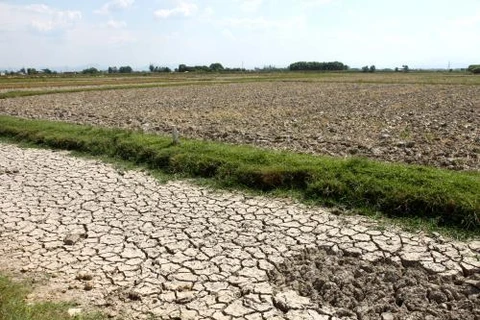Can Tho (VNA) – Experts from the UN Human Settlements Programme (UN-Habitat) and Japan met at a seminar in the Mekong Delta city of Can Tho on March 17 to discuss the application of emission-reducing technology in urban economic development and enhancement of climate change adaptability.
Director of UN-Habitat Vietnam Nguyen Quang said the rate of urbanisation in Vietnam now reaches 34 percent but urban areas account for 70 percent of the total emissions, which has seriously degraded natural resources and polluted the environment.
Most major urban areas such as Hanoi, Ho Chi Minh City, Hai Phong, Da Nang and Can Tho are in plain and coastal areas. With such rapid urbanisation, they are vulnerable to the impacts of climate change due to weak technical and social infrastructure.
The Mekong Delta is sinking by 2cm compared to sea water level each year while weak water supply and drainage system exposes regional urban areas to the threat of flooding and traffic congestion during the rainy season, he said.
To counter such problems, Japan’s Taiho Metals company introduced a system of water-proof doors and flooding shields with 4D design and shock-resistant materials.
At the event, scientists also raised their concern about the shortage of fresh water in the region due to drought and saline intrusion – the consequences of gas emission and pollution from unsustainable urbanisation.
Participants suggested developing buffer zones to protect coastal urban areas, planting mangrove forests to block waves and reduce erosion, limiting groundwater exploitation and preventing water surface pollution.
Norishika Matsuo from Japan’s Daiken Corporation presented an underground reservoir model capable of holding 100 tonnes of water used for daily life and vegetable cultivation. It could be set up within a week at low cost and is suitable for apartments.
A number of opinions proposed developing green buildings and building ecological urban areas in order to reduce emissions, making it easier for urbanites to adapt to climate change.
In urban areas at risk of saltwater intrusion, Japanese experts suggested using seawater desalination technology.
A representative from Kyowakiden company said its sea water desalination system uses pressure-retarded osmosis to process more than 50,000 cu.m per day, adding that it is being widely used in Japan and China.
Vice Chairwoman of the municipal People’s Committee Vo Thi Hong Anh lauded the feasible and practical use of the Japanese technologies introduced at the event, and vowed to outline a strategy to the make the best use of local partnership with Japan.
She informed that Can Tho has devised a project to use energy effectively and economically, including facilitating the use of renewable energies, solar radiation, geothermal, tidal wave and biogas instead of coal.
Can Tho is building a climate change-resilient urban development planning and strategy, under which, a proper water drainage system will be built, among others.-VNA
Director of UN-Habitat Vietnam Nguyen Quang said the rate of urbanisation in Vietnam now reaches 34 percent but urban areas account for 70 percent of the total emissions, which has seriously degraded natural resources and polluted the environment.
Most major urban areas such as Hanoi, Ho Chi Minh City, Hai Phong, Da Nang and Can Tho are in plain and coastal areas. With such rapid urbanisation, they are vulnerable to the impacts of climate change due to weak technical and social infrastructure.
The Mekong Delta is sinking by 2cm compared to sea water level each year while weak water supply and drainage system exposes regional urban areas to the threat of flooding and traffic congestion during the rainy season, he said.
To counter such problems, Japan’s Taiho Metals company introduced a system of water-proof doors and flooding shields with 4D design and shock-resistant materials.
At the event, scientists also raised their concern about the shortage of fresh water in the region due to drought and saline intrusion – the consequences of gas emission and pollution from unsustainable urbanisation.
Participants suggested developing buffer zones to protect coastal urban areas, planting mangrove forests to block waves and reduce erosion, limiting groundwater exploitation and preventing water surface pollution.
Norishika Matsuo from Japan’s Daiken Corporation presented an underground reservoir model capable of holding 100 tonnes of water used for daily life and vegetable cultivation. It could be set up within a week at low cost and is suitable for apartments.
A number of opinions proposed developing green buildings and building ecological urban areas in order to reduce emissions, making it easier for urbanites to adapt to climate change.
In urban areas at risk of saltwater intrusion, Japanese experts suggested using seawater desalination technology.
A representative from Kyowakiden company said its sea water desalination system uses pressure-retarded osmosis to process more than 50,000 cu.m per day, adding that it is being widely used in Japan and China.
Vice Chairwoman of the municipal People’s Committee Vo Thi Hong Anh lauded the feasible and practical use of the Japanese technologies introduced at the event, and vowed to outline a strategy to the make the best use of local partnership with Japan.
She informed that Can Tho has devised a project to use energy effectively and economically, including facilitating the use of renewable energies, solar radiation, geothermal, tidal wave and biogas instead of coal.
Can Tho is building a climate change-resilient urban development planning and strategy, under which, a proper water drainage system will be built, among others.-VNA
VNA





















